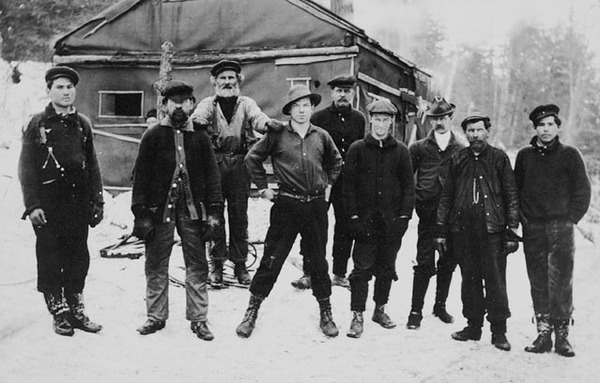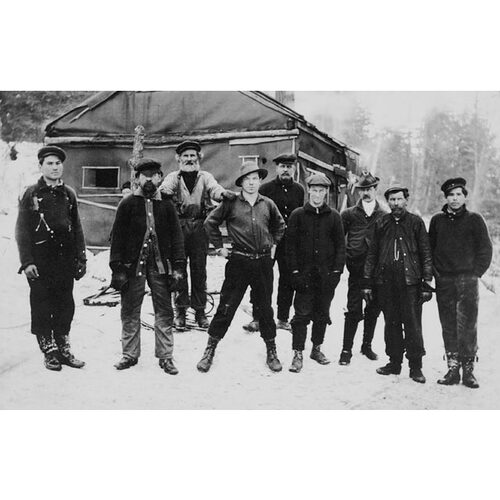FITZPATRICK, ALFRED, Presbyterian minister, teacher, author, and administrator; b. 22 April (the date on his gravestone) or 23 April 1862 (the registered date) in Millsville, N.S., son of Alexander Fitzpatrick and Mary Rae; d. unmarried 16 June 1936 in Toronto and was buried in that city’s Mount Pleasant Cemetery.
The eleventh child in a family of 12, Alfred Fitzpatrick was raised on a farm in Pictou County, N.S. He attended Pictou Academy, established by Thomas McCulloch*, and in 1884, at the age of 22, entered Queen’s College in Kingston, Ont. After receiving his ba in 1889, he studied theology at Queen’s. Ordained a Presbyterian minister in 1892, he then became an itinerant preacher, serving in California (1892–93), New Brunswick (1893–96), and what was to become Saskatchewan (1896–98) before finally settling in Nairn Centre, near Sudbury, Ont., in 1899.
While at Queen’s, Fitzpatrick had come under the influence of the college’s principal, George Monro Grant*, from whom he imbibed the ideals of the Social Gospel movement. Later, during his travels in North America, Fitzpatrick’s progressive brand of Christianity was reinforced as he encountered first-hand the poverty and strenuous working conditions experienced by miners, lumbermen, and railway navvies. Believing, as most Social Gospellers did, that education was a vital tool in improving the lot of the marginalized, Fitzpatrick decided to forgo his religious calling and focus on teaching among the “toilers of forest, mine and railway construction,” whose difficult working environment he was soon to describe as “nothing short of criminal.” He successfully lobbied the Ontario government for travelling libraries on the frontier – “Literature,” as he put it, “will stand transportation as well as pork and beans” – and in 1899 or 1900 established the Canadian Reading Camp Movement to provide mine, lumber, and railway worksites with reading rooms; the first such facility opened near Nairn Centre. By 1902 Fitzpatrick had introduced the concept of a labourer-teacher whereby university undergraduates would work with the men during the day and teach at night; during the winter of 1902–3 there were 30 reading rooms in Ontario. Renamed the Reading Camp Association by 1903, it was funded in its early years by donations from various organizations, especially women’s groups, and from the public at large. It also had a number of prominent supporters, including John Charlton*, John Rudolphus Booth*, Sir Thomas George Shaughnessy*, Sir Sandford Fleming*, and David Blythe Hanna. Fitzpatrick was the association’s driving force, his titles over the years changing from secretary (1902) to general secretary (1903) to superintendent (1905).
In 1909 Fitzpatrick moved his headquarters from northern Ontario to Toronto for better contacts with government and industry leaders. Despite his location in the city, he did not concentrate on urban social problems but maintained his commitment to workers in the primary-resource sector, who were unprotected by unions and invisible to social reformers. He spent much of his time journeying to the camps and raising support – in the form of both reading material and money – for his association. He constantly lobbied the federal and provincial governments to improve living conditions in the camps, and, in his efforts to promote his organization, he turned to industrialists such as Joseph Wesley Flavelle and authors such as Charles William Gordon (Ralph Connor). In 1910 Governor General Lord Grey* became a patron. By 1913 there were 75 labourer-teachers across Canada; one of them, in 1911–12, was Henry Norman Bethune. The Reading Camp Association also had a presence in the United States; labourer-teachers were recruited from American universities, and in 1915–18 four labourer-teachers served in Washington State.
The association pursued its mission throughout World War I, albeit on a somewhat smaller scale since many potential labourer-teachers joined the armed forces. With the end of the war and fears that the threat of Bolshevism was spreading from Europe to Canada, Fitzpatrick saw new possibilities for his organization, which in 1919 was renamed Frontier College. The federal government had embarked on a policy of Canadianization to counteract the “Red Scare,” and there seemed no better place to pursue this policy than in the work camps crowded with recent immigrants where Frontier College operated.
Fitzpatrick set out his philosophy of adult education in two volumes, Handbook for new Canadians (Toronto, 1919) and The university in overalls: a plea for part-time study (Toronto, 1920). Both exhibit the influence of contemporary progressive thinking as well setting out a practical, hands-on pedagogy. Handbook for new Canadians was the nation’s earliest guide to adult education. A combination of history, geography, literature, and grammar, the handbook offered a program for instilling Canadian values in immigrant camp workers; each labourer-teacher recruit was provided with a copy before leaving for his or her post (in 1920 there were three women labourer-teachers, two working in Nova Scotia factories and one in rural Saskatchewan). The university in overalls presented Fitzpatrick’s vision of Frontier College as a national institution that would educate people wherever they were and in which both faculty and students would have important roles to play.
In 1922 Fitzpatrick’s dogged back-room lobbying and sheer persistence bore fruit when the federal parliament passed Bill 68, which recognized Frontier College as a university able to award degrees to students anywhere in Canada, the first such institution in the country. By 1925, through extramural study exclusively, the college was offering a variety of courses leading to a ba and ma. Its volunteer faculty was drawn from the English and French professoriate of many Canadian universities, its board of examiners included such figures of distinction as Charles George Douglas Roberts*, and its audience was “men and women of maturer years” unable “to attend a centrally located university.” Fitzpatrick served as the college’s principal.
From the start, Fitzpatrick’s vision of a national university reflected a brand of progressive education that was becoming increasingly popular internationally and that in Canada led to the creation of the Khaki University for servicemen (1918), extension departments in various Canadian universities (McGill and the University of Toronto, 1920, and the University of Western Ontario, 1921), the People’s School at St Francis Xavier College (1921–22), and a Toronto branch of the United Kingdom-based Workers’ Educational Association (1918). Yet, despite Frontier College’s disclaimer that it did not overlap with other universities, powerful forces soon mobilized in opposition. The Ontario government, first under George Howard Ferguson* and then under George Stewart Henry*, exerted intense political and financial pressure on the college, its case hinging on provincial control over education as outlined in the British North America Act. Ontario grants to the college (amounting to $28,000 in the 1924–28 period) were halted in 1928, leading Fitzpatrick to complain that the task of keeping the college afloat without funding was “infinitely worse than slavery.… No man who has never financed in such conditions has any conception of that hell and fire.” Hostility also came from some universities, particularly the University of Toronto under the leadership of Sir Robert Alexander Falconer*, concerned with maintaining their control over the higher-education curriculum and the granting of degrees.
Ultimately, notwithstanding the support given to Fitzpatrick by figures such as Newton Wesley Rowell* and Joseph E. Atkinson*, Frontier College was forced to surrender, ceding its right to award degrees in Ontario in 1931 and nationally the following year. In exchange, the Ontario government renewed the funding that had been stopped in 1928 (there had never been any federal funding and financial support from other provinces was always scanty). By 1931 17 students had enrolled in the college’s university program and three had received degrees, two bas and one ma. With Ontario funding restored, the number of labourer-teachers increased from 44 in 1929 to 85 in 1933–34, by which point the college was instructing 5,000 adults. The college continues to operate in the early 21st century, though its focus is no longer workers on the frontier but all those requiring literacy training and remedial assistance, whether in rural or urban Canada. Its reputation in the field of adult education has only grown since Fitzpatrick’s time.
The struggle for the survival of Frontier College had exhausted Alfred Fitzpatrick. Opposed by both the college board and his director of labourer-teachers, Edmund William Bradwin*, whose priority was the activities of labourer-teachers rather than the grand goal of a national university, Fitzpatrick resigned as principal in 1933. He was succeeded by Bradwin. In his remaining years, Fitzpatrick continued to fund-raise despite medical problems. He was named principal emeritus and in April 1936, two months before his death, was awarded an obe.
By his pursuit of education for the disadvantaged – “Education,” he said, “is the God-given right of every man, not the exclusive privilege of a few favoured persons” – Alfred Fitzpatrick had sought to release the human potential in each individual for the benefit of all. Until his final days, he laboured over a manuscript, which showed that his passion as an activist had not declined. It was called “Schools and other penitentiaries” and remains unpublished.
As well as the works mentioned in the biography, Alfred Fitzpatrick is the author of two articles published in the Canadian Magazine: “Life in lumbering and mining camps: a plea for reform,” 17 (May–October 1901): 49–52 and “The neglected citizen in the camps,” 25 (May–October 1905): 43–48.
LAC, R3584-0-0, vols.1, 107, 170 (corr.), 153, 154 (principals’ files), 263 (annual reports and annual meetings, finances). QUA, Queen’s Univ., Office of the Univ. Registrar fonds, 1842–1981, coll. 1161, vol.3, no.1411. “Adult education in Canada,” Journal of Adult Education (Philadelphia), 6 (1934): 232–33. G. L. Cook, “Alfred Fitzpatrick & the foundation of Frontier College (1899–1922),” Canada: an Hist. Magazine (Toronto), 3 (1975–76), no.4: 15–39. G. L. Cook, with Marjorie Robinson, “‘The fight of my life’: Alfred Fitzpatrick and Frontier College’s extramural degree for working people,” Social Hist. (Ottawa), 23 (1990): 81–112. Frontier College, Calendar (Toronto), 1929/31. Frontier College letters: one hundred years of teaching, learning & nation building, comp. Larry Krotz et al. (Toronto, 1999). E. L. Martin, “Action and advocacy: Alfred Fitzpatrick and the early history of Frontier College” (ma thesis, Univ. of Toronto, 2000). J. H. Morrison, “‘Black flies, hard work, low pay’: a century of Frontier College,” Beaver, 79 (1999–2000), no.5: 33–38; Camps & classrooms: a pictorial history of Frontier College (Toronto, 1989). Reading Camp Assoc., Annual report (Toronto), 1913. E. W. Robinson, “The history of the Frontier College” (ma thesis, McGill Univ., Montreal, 1960). D. R. Sutherland, “Alfred Fitzpatrick and the Frontier College” (bd thesis, Atlantic School of Theology, Halifax, 1968). M. E. Zavitz, “The Frontier College and Bolshevism in the camps of Canada, 1919–1925” (ma thesis, Univ. of Windsor, Ont., 1974).
Cite This Article
James H. Morrison, “FITZPATRICK, ALFRED,” in Dictionary of Canadian Biography, vol. 16, University of Toronto/Université Laval, 2003–, accessed December 29, 2025, https://www.biographi.ca/en/bio/fitzpatrick_alfred_16E.html.
The citation above shows the format for footnotes and endnotes according to the Chicago manual of style (16th edition). Information to be used in other citation formats:
| Permalink: | https://www.biographi.ca/en/bio/fitzpatrick_alfred_16E.html |
| Author of Article: | James H. Morrison |
| Title of Article: | FITZPATRICK, ALFRED |
| Publication Name: | Dictionary of Canadian Biography, vol. 16 |
| Publisher: | University of Toronto/Université Laval |
| Year of publication: | 2017 |
| Year of revision: | 2017 |
| Access Date: | December 29, 2025 |




